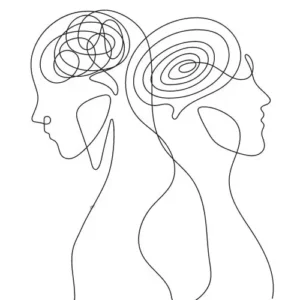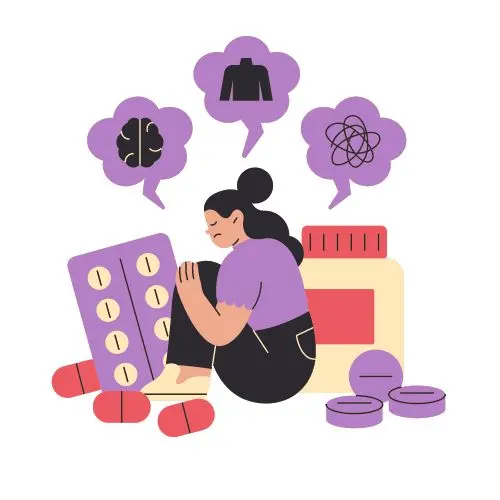Science Behind Stress Addiction
Stress is now an inescapable part of modern life. Many are utterly stressed with piling work pressures, family responsibilities, financial worries, and always being online. Now while some amount of stress does motivate and gets us to work through sticky situations, chronic or prolonged stress is highly debilitating for our physical and mental well-being.
Did you know? It is actually possible to get addicted to stress. At first instance, the notion of stress addiction may sound foreign or even counterintuitive to the human mind. In reality, however, the research eventually reveals that very much lies in psychological and physiological mechanisms that may lead to stress addiction. In this article, we shall go deeper into the science behind stress addiction, the symptoms you might have, and how you can break your unhealthy dependence on stress hormones.
Showing key facts and figures about stress addiction:
- Around 15-20% of the population shows addictive behaviors and tendencies related to stress.
- The part of the brain linked to addiction and reward (nucleus accumbens) gets activated during stressful situations for those prone to stress addiction.
- Cortisol and adrenaline, the primary stress hormones, stimulate the brain’s reward centers similarly to drugs, providing a “high.”
- Stress addiction is associated with perfectionism, people-pleasing tendencies, workaholism, and a constant need for stimulation/busyness.
- Prolonged stress causes downregulation of glucocorticoid receptors in the brain over time, resulting in greater stress/stimulation needed for the same “high.”
- Meditation, yoga, exercise, therapy, and relaxation techniques can help retrain the brain away from stress addiction.
Understanding the Science Behind Stress Addiction

Stress exposes the body to a fight or flight response, which is an effect that releases stress hormones such as cortisol and adrenaline. These hormones were designed by evolution to give us a shot of energy during acute episodes of stress to react quickly to threats.
But in today’s times, when stress is chronic and not episodic, our body remains alert for considerable periods. This, over time causes a lot of wear and tear in the body and changes the chemistry of our brain.
Studies suggest that for those carrying addictive tendencies, stress is as engaging to the brain’s reward centers as drugs of abuse. The activation of the nucleus accumbens, a crucial area involved with motivation, pleasure, and addiction, occurs during stressful experiences.
This activates the dopamine-based reward system of the brain, providing feelings of pleasure, motivation, and a “high.” For stress addicts, this pursuit of stress high, over time through the work of principles that make up operant conditioning, becomes a rewarding behavior.
Stress hormones such as cortisol and adrenaline acutely stimulate the brain’s reward centers. However, chronic elevation downregulates glucocorticoid receptors in critical areas, particularly the prefrontal cortex. This leads to needing increased stimulation over time just to feel the same “high,” thus similar to drug tolerance.
Stress junkies basically get addicted to their stress hormones and start living by them as they only feel motivated, happy, and rewarded when under the influence of stress. This wreaks havoc on their brain, which now demands the same stimulating feelings when it is under stress; there is difficulty in relaxing or calming down simply because their biology has been rewired to find stress rewarding rather than aversive.
Signs You May Have A Stress Addiction

If the following signs and behaviors seem familiar, you may have an unhealthy relationship with stress:
- You find it hard to relax or take time off as it makes you feel unproductive
- You constantly seek stimulation through a busy schedule, multitasking or taking on too many responsibilities
- You derive a sense of worth, value, or importance from being stressed and busy
- Failure to meet unrealistic standards or deadlines causes immense anxiety
- You have perfectionist tendencies and can’t accept imperfect work
- People-pleasing is important, and you base your self-esteem on being needed
- Stressful situations provide a “high” and sense of motivation you continually seek to replicate
- Withdrawal-like symptoms occur when not busy such as restlessness, irritability or low mood
- Unhealthy coping mechanisms are used like overworking, excessive caffeine, alcohol or substances
If several of these apply, it suggests your brain’s reward system has become trained to find stress pleasurable rather than aversive over time through repeated activation. You may have developed an unhealthy psychological and physiological dependence on stress hormones.
Overcoming Stress Addiction Through Mind-Body Techniques

Breaking free from stress addiction requires retraining your brain’s reward pathways so they no longer get stimulated by stressful experiences. Here are some effective strategies:
- Meditation – Helps reduce stress reactivity while growing self-awareness of triggers and thought patterns.
- Yoga – Combines physical postures with breathwork to wind down the nervous system and relax the body.
- Exercise – Releases feel-good endorphins and gets adrenaline flowing through enjoyable physical activity rather than stress.
- Mindfulness practices – From daily awareness meditations to keeping a stress journal, it cultivates present moment focus.
- Therapy – Cognitive behavioral therapy addresses unhelpful thought patterns and behaviors related to stress addiction.
- Assertiveness training – Learns to decline responsibilities and say no to unhealthy people-pleasing tendencies.
- Relaxation techniques – Progressive muscle relaxation, guided imagery, and deep breathing help switch off stress responses.
- Adequate sleep – Critical to regulate stress hormones and recharge the body’s parasympathetic nervous system each night.
- Nutrition – A balanced whole foods diet provides steady energy without spikes and crashes from caffeine/sugar.
- Social support – Connecting with non-judgmental loved ones helps gain perspective beyond one’s stress addiction tendencies.
Reprogramming stress addiction takes time and consistency. With regular mindful practice, you can train your brain and body to find relaxation, not overstimulation, as the new normal – leading to healthier relationships with stress and yourself.
Conclusion
Our fast-paced lives often mean we wear stress as a badge of honor. However, prolonged activation of the body’s stress response takes a severe toll. For some individuals, stress can even become psychologically and physiologically addictive due to changes in brain chemistry over time.
While challenging to overcome, stress addiction is very treatable through mind-body therapies that retrain neural pathways away from finding stress rewarding. Making lifestyle choices geared towards relaxation and self-care and reducing inner tension are key. With a commitment to practices like meditation, yoga, therapy, and restorative activities, it is possible to break free from this unhealthy dependence on the “high” of stress hormones.

